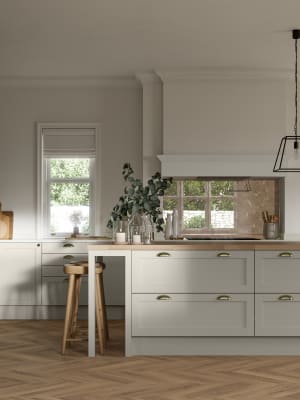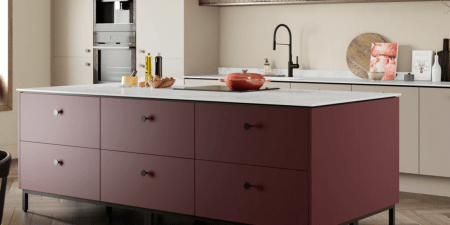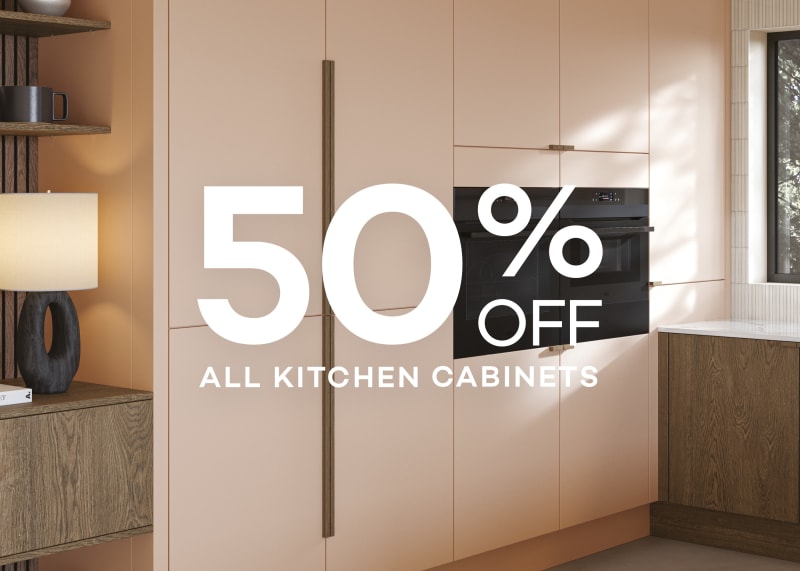Why have an open-plan living room kitchen?
Discover how to create multi-purpose spaces that are both beautiful and practical, with our guide to open-plan kitchens.
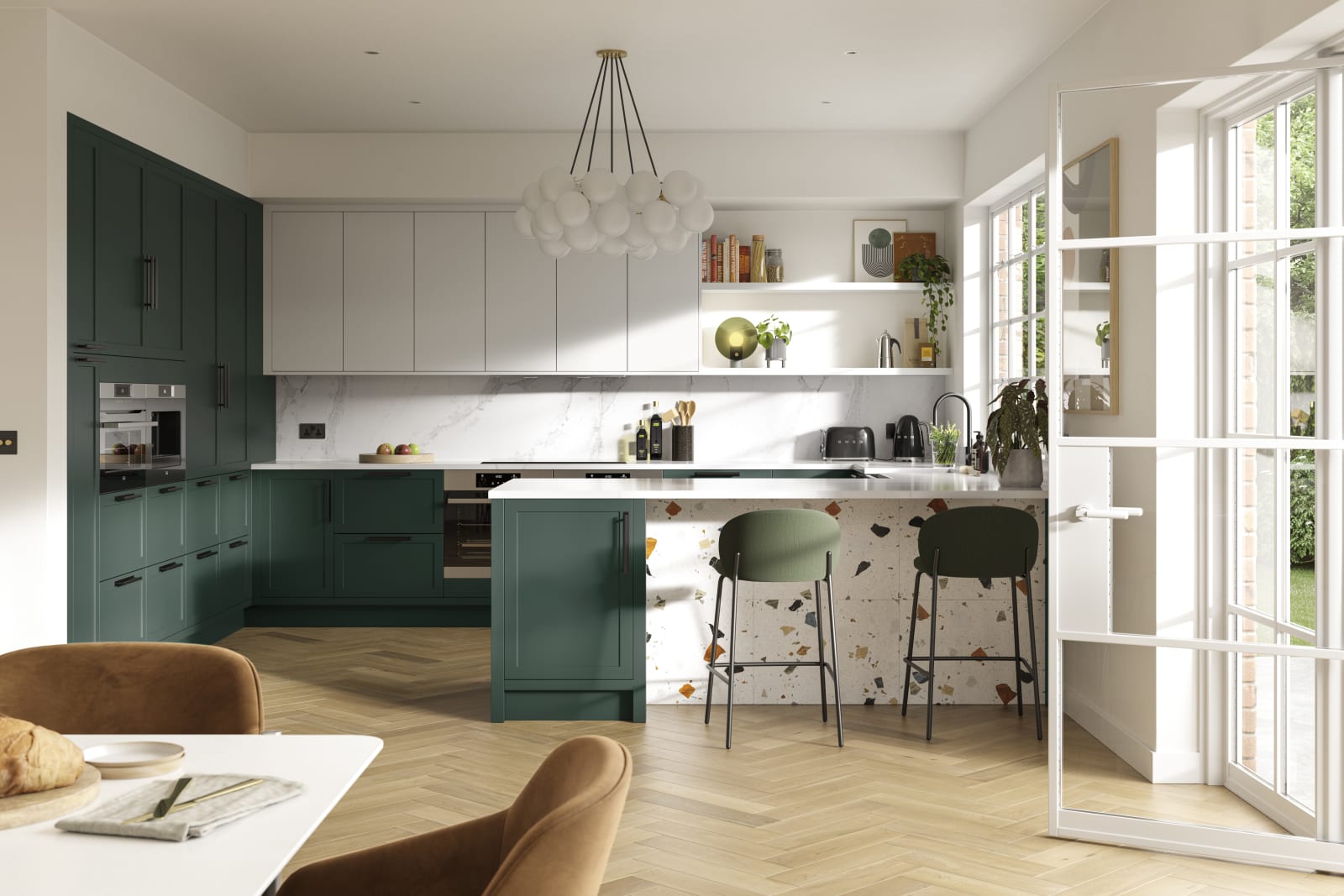
Whether you’re looking to optimise space or design a more functional home for you and your family, an open-plan living room kitchen could be the best decision you make.
The open-plan concept has been around since the 1920s, with the term “le plan libre” (the free plan) coined by French-Swiss architect, Le Corbusier. This style of living became hugely popular in the 1970s and remains sought after by homeowners today.
Through removing barriers such as walls and doors, it’s possible to create a room with more than one function.
We’ll explore the pros and cons of the concept, and share tips on beautiful, effective open-plan kitchen /dining /family room design.
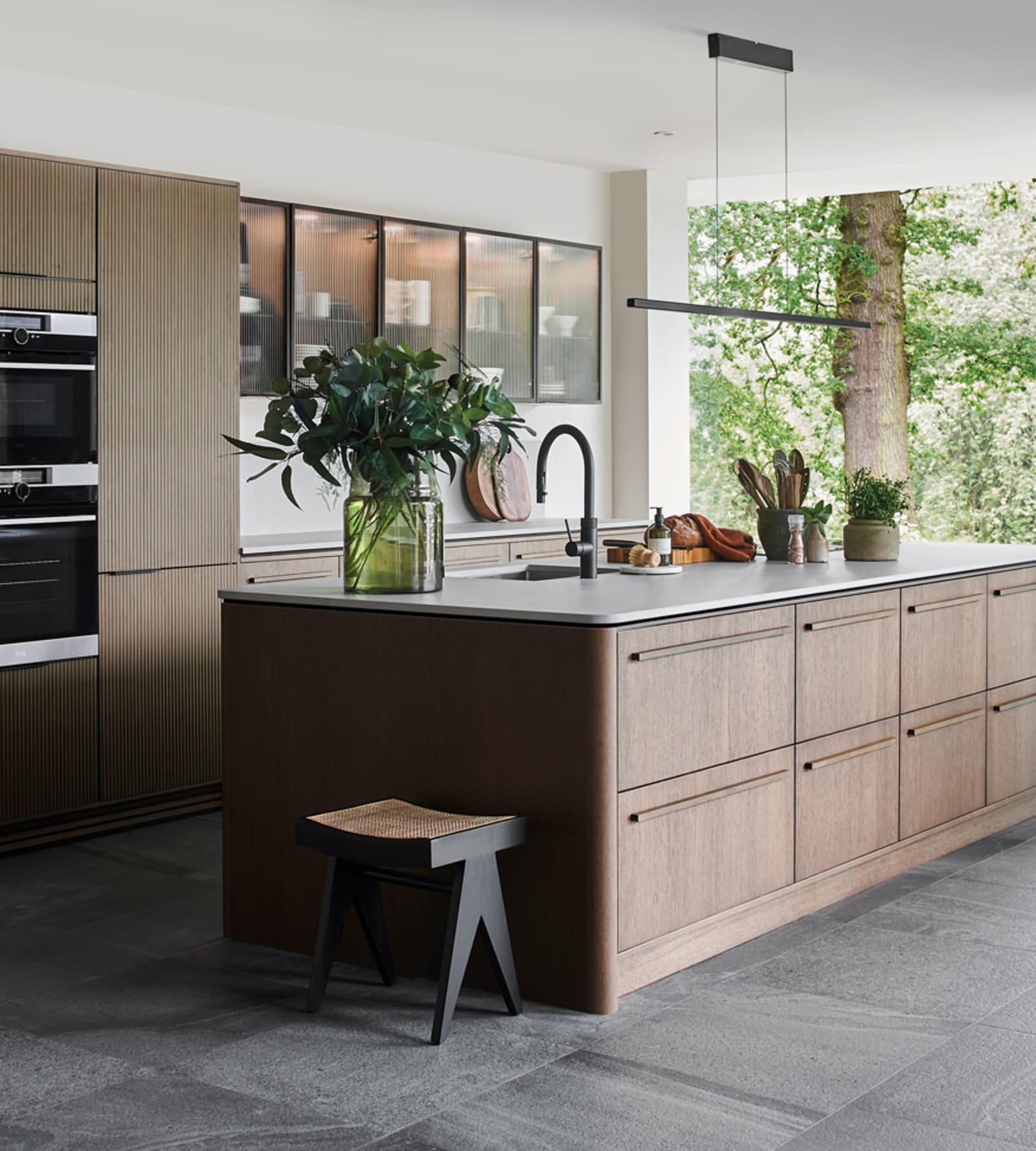

Benefits of an open-plan kitchen
Many people love the idea of an open-plan home because it makes it easier to practise sociable living, combining multiple functions and features into one large space. Here are some of the advantages of choosing this effortlessly stylish kitchen layout:
- It’s family-friendly
Get the most out of family time by creating a sociable cooking, eating and living area that everyone can enjoy, at any time of the day.
- A space to entertain
If you love having guests over for dinners, parties and other gatherings, an open-plan kitchen lounge gives you the perfect reception area.
- Allow for multiple chefs
A larger open-plan kitchen also accommodates more than one chef. Its spacious triangle layout allows for plenty of room for cooking, cleaning and prepping. This means food-focused families can have fun cooking and baking together.
- Let more light in
Fewer walls and doors also mean more natural sunlight, resulting in a light and airy space that looks and feels much more spacious.
- Increase home value
Open-plan kitchens are a coveted feature, with many buyers preferring this layout to traditional kitchens and living rooms. The illusion of more space will also help to sell your home in the future, boosting your property’s overall value.
- Great for multitasking
Whether you work from home or you need to keep an eye on the kids while cooking, an open-plan kitchen /dining /family room allows you to juggle multiple things at once.
Disadvantages of an open-plan kitchen
Although an open-plan kitchen lounge brings a multitude of benefits, it may not suit everyone. Here are some things to think carefully about before choosing this layout for your kitchen:
- It can be harder to heat
With a much larger and open space, your home could cost more to heat. It could be beneficial to add underfloor heating or search for more energy-efficient heating solutions.
- There’s less privacy
While kitchens doubling up as a dining space and even an office are very popular, it’s important to bear in mind that you won’t get as much private time. For those who work from home, the added noise may be something you need to consider carefully too.
- Smells can linger
Good ventilation and airflow are key, as smells from cooking can stick around. Things like opening windows and using air purifiers can help, but the most important feature to include during the design phase is a good-quality, well-positioned extractor hood.
- It can be mess-prone
Clutter or mess in one area of an open-plan room will affect the other areas (you can’t close the door and forget about it). This is why careful storage planning is essential.
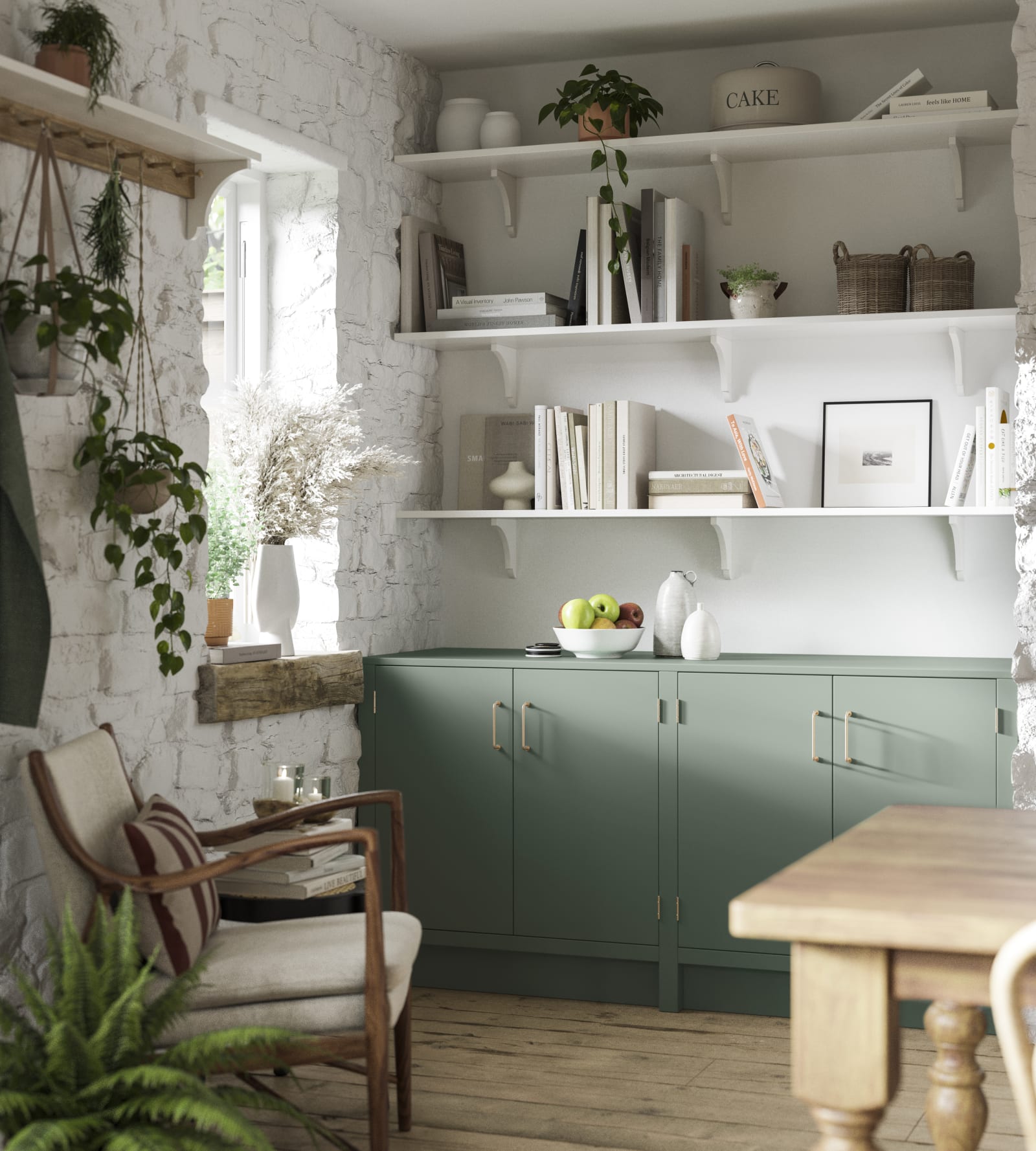

How do you create an open-plan living room kitchen?
In one sense, designing an open-plan living room kitchen is easy because you’re not restricted by walls and partitions. But like everything, the hardest part is knowing where to start, and when it’s a blank canvas it can be tricky getting a sketch down on paper.
Here are some quick tips to help you kickstart the process:
- Look for inspiration
Get inspired by our real-life customer kitchens or use image-sharing sites like Pinterest to gather ideas on colours and kitchen design styles.
- Have clear goals
What sort of space are you trying to create? Do you want a simple, dual-function kitchen diner? Or are you looking for a multi-purpose, fully open-plan kitchen, dining, family room with an office or play area? Having a list of features in priority order could be helpful too when trying to stay within budget.
- Contact a design expert
Working with professional kitchen designers can give you the support you need to navigate the design process. Our Design Consultations are free and give you an idea of price, and can be done in-person or online.
- Focus on the layout
The layout of your space is the most important factor during the design stage. Consider things like traffic flow, the distance between appliances and workspaces, designs that allow for social interaction, storage solutions, and placement of countertops.
What are some open-plan kitchen ideas?
Need something to get the creative juices flowing for your open-plan kitchen renovation? Here are some ideas that could turn your kitchen dreams into a viable design plan:
Create a chill-out zone
A multifunctional space can be highly practical, but it can also be chaotic - especially in a family home with lots of different things going on at once.
Having a chill-out area with chairs or comfy seating can give you a chance to take a break, and can make the space conducive to calmer activities for the kids.
Section off an area
If you want to create an open-plan kitchen lounge area that’s comfortable for the whole family, it helps to use zoning techniques to create dedicated spaces for cooking, eating or relaxing.
This can be done with furniture or worktop placement, as well as applying different colours or even textures to generate different focal points.
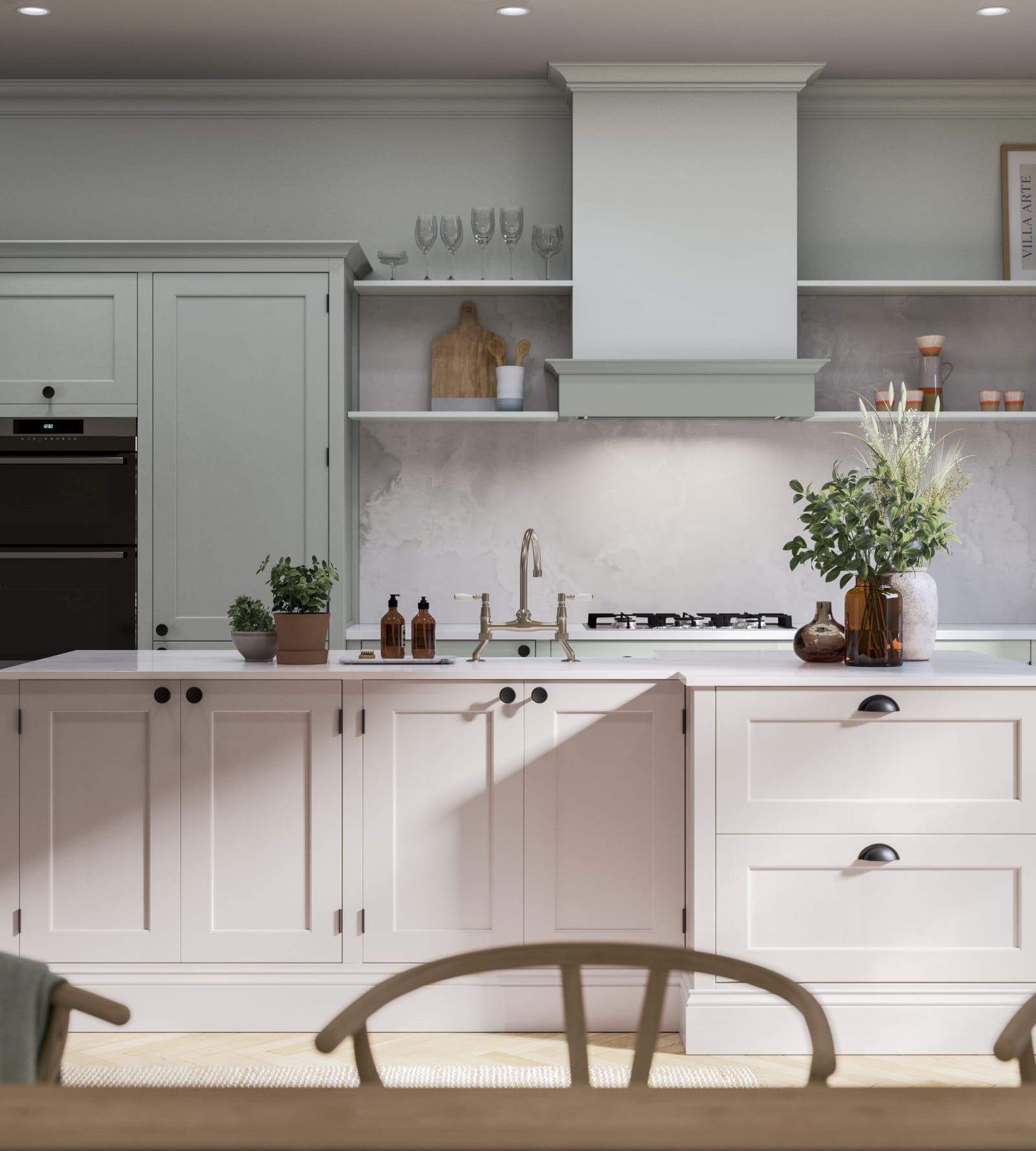
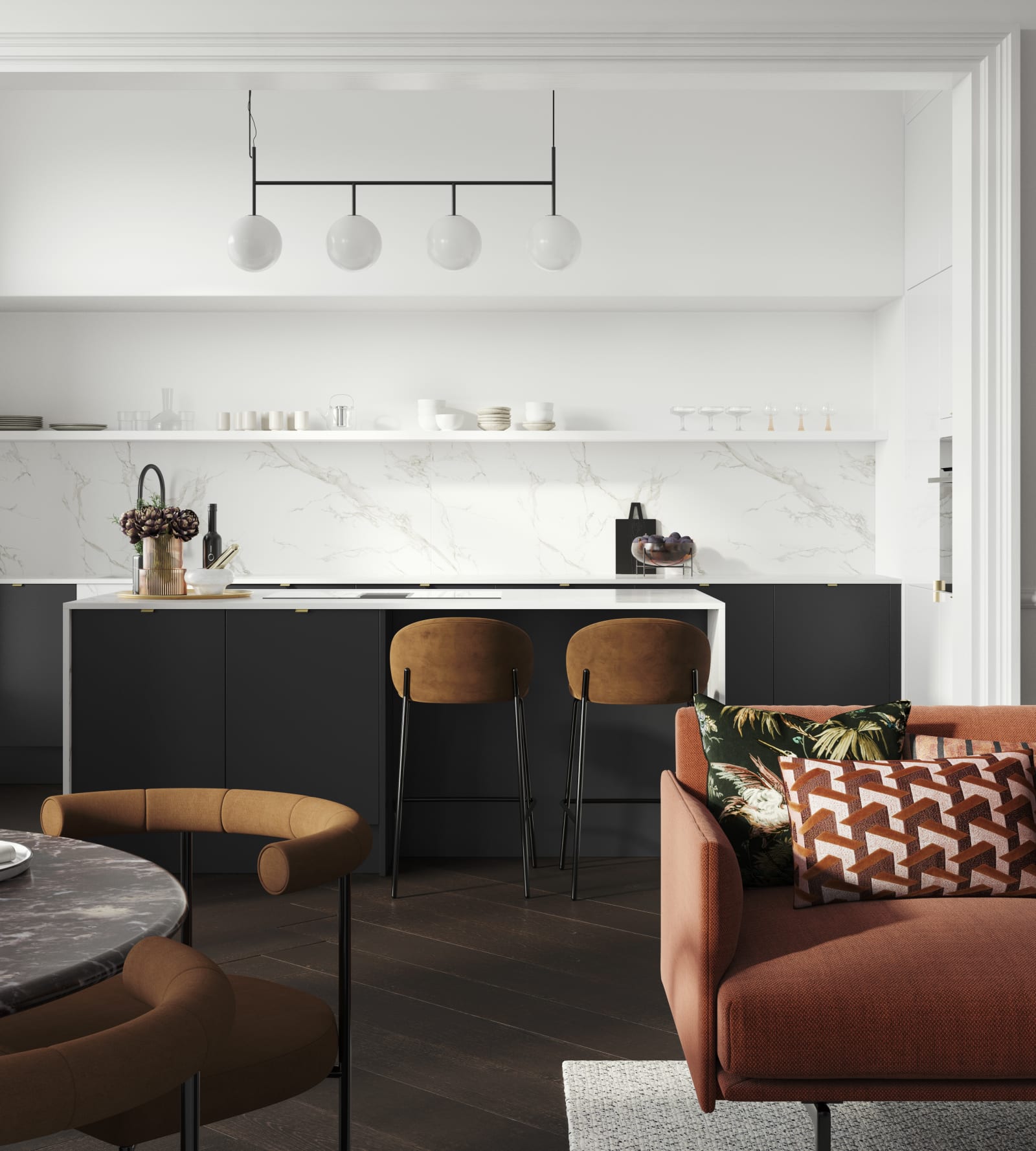
Arrange furniture strategically
After deciding on the layout of your kitchen units, where you place your furniture is the next most important step.
Consider which areas you want to be able to socialise in. For instance, a dining table or breakfast table facing the cooking zone means the chef can entertain and prepare food at the same time.
A sofa or bench facing away from the main cooking zone can mean a little extra privacy when you have guests over.
Follow a colour palette
There are a few basic colour schemes you can choose from.
These are tonal colours (monochromatic), harmonious colours (colours that are next to each other on the colour wheel) or complementary colours (contrasting hues that sit opposite each other on the colour wheel).
Each offers a different look or effect, and choosing one will guide you as you decorate your space.
For instance, the harmonious colour scheme is easy on the eye and can be used to create a relaxing space.
Opting for a monochromatic scheme works well with minimalist homes, while colour pops and colour contrasts instantly add interest and intrigue to your concept.
Use lighting and flooring as design features
The right lighting can bring your kitchen to life, and size matters too when it comes to light fittings and fixtures.
Oversized lamps or chandeliers can help you fill a large area that would otherwise appear bare, adjusting perspective and preventing an open-plan home from feeling unfinished.
When it comes to flooring, the choice of colour or material can make all the difference. Wood can add warmth or a rustic edge, while marble can give you a high-end finish.
Invest in artistic decor
Decorative walls or artwork can create helpful focal points in a large, open-plan room, helping to section different areas or improve flow and movement.
It’s the small details that count, so consider saving a good amount of your budget for a few quality pieces or creative features.


How to get started
Open-plan living can change the way you approach daily tasks and even elevate your quality of life.
But designing a harmonious space requires careful planning as you will be combining the functions of more than one room.
If you love hosting or want to spend more quality time with your family, an open-plan living room kitchen or kitchen diner is a worthwhile investment.
Not only will it open up your space and boost natural light, but open-plan kitchens are highly sought-after and can increase the value of your home too.
To begin the process of designing an open-plan kitchen, diner or lounge, browse our kitchen collections and other blogs for inspiration.
If you want further inspiration or advice about designing an open-plan kitchen, chat to one of our Magnet design experts at a no-obligation Design Consultation.





